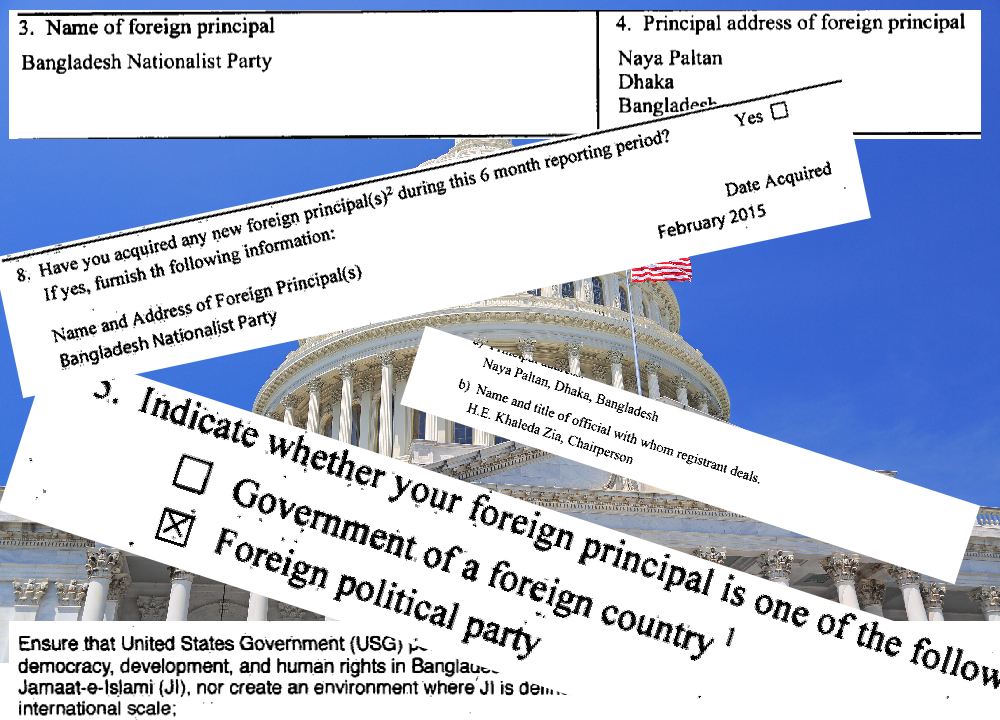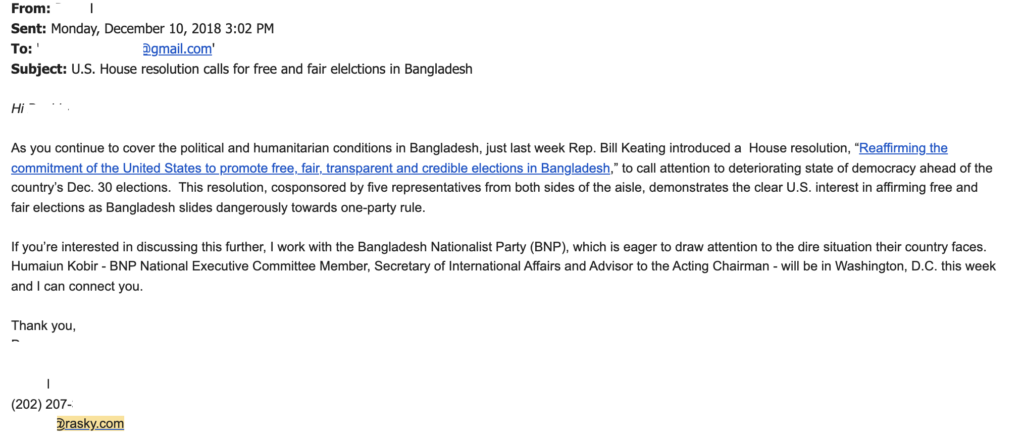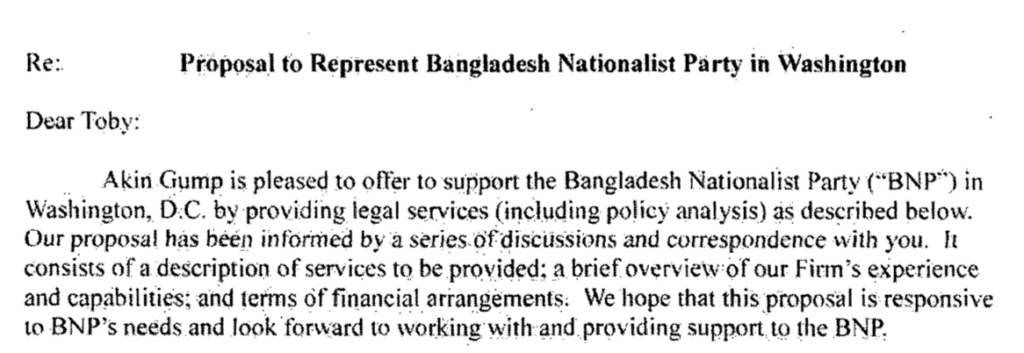The truth about BNP and Jamaat lobbying
Neither the Awami League government nor the Bangladesh Nationalist Party is telling the truth about lobbying in the United States.

Shahriar Alam, Bangladesh’s state minister for foreign affairs, claimed at a press conference on January 18th, 2022 that the Bangladesh Nationalist Party (BNP) spent $3.7 million to pay for lobbying in the United States. Without mentioning an amount of money, he also said that Jamaat-e-Islami had done a lot of lobbying in the United States, referring to four lobbying documents linked to the party.
He was speaking following a report by Netra News that showed the Awami League government had spent $2.3 million in lobbying in the United States since 2014.
A week later, speaking in parliament, the foreign minister upped the allegation claiming that “The BNP spent $2.7 million annually from February 2015 to April 2017. It spent $120,000 per month in retainer fees. The information is available on US websites.”
In Alam’s initial press conference, his main concern, however, was not in the opposition party lobbying in itself, but rather the source of the money, and in particular how the parties could pay for the lobbying considering the obstacles in taking money out of the country legally, and whether they had correctly accounted for the lobbying payments in their financial audits to the Bangladesh Election Commission.
“Agreements were signed using the address of the BNP, so we can assume that the BNP directly paid the amount, which is $3.75 million,” the state minister said. “[We want to see] if the money was transferred with clearance from Bangladesh Bank. If not, then there is legislation operating in Bangladesh [for that]. Bangladesh Bank will certainly act accordingly.”
He also thought that the parties may have breached Election Commission rules, “You know that under 9 (b) or (c) of the rules for registration of political parties, it clearly states that a political party will publish its earnings and spending at the end of every year.”
On the following day, the foreign ministry wrote to the central bank requesting it to scrutinise the financial transactions made by BNP to recruit lobbyists in the United States and to the Election Commission concerning whether the party had mentioned any transactions in their statements of income and expenditure.
On January 25th, BNP’s Secretary General Mirza Fakhrul Islam Alamgir held his own press conference denying that the party had appointed any lobbyists in the United States, “It is clear that BNP has not appointed any lobbyist. I hope you (journalists) would not have any confusion about it …. It is not right at all that we have hired lobbyists.”
Let us consider the accuracy of both the claims of the government ministers and of the BNP secretary general. This is possible because lobbying firms in the United States are legally required to submit financial and other details of any lobbying undertaken by or on behalf of any foreign government or political party.
Level of opposition lobbying
Bangladesh Nationalist Party: Based on the publicly available databases of lobbying spending in the US, Netra News has identified five lobbying firms hired by, or for, the BNP since 2007 when the BNP was in opposition.
In August 2018, Blue Star Strategies LLC was hired by UK-based BNP leader Abdul Sattar to “promote the goals of the Bangladesh Nationalist Party (BNP) for the upcoming elections in Bangladesh”. In addition, the firm also developed a strategy “that educates officials, policy influencers and the media about the BNP and its interests in free and fair elections” and drafted a “narrative to communicate the BNP’s goals”. The contract was signed by Sattar as an individual — but the documentation suggests that he was acting on behalf of the BNP. In the section of the form which states that the name of the “foreign principal” was Abdul Sattar, it is confirmed that he is a “foreign political party”.
In addition, in the section of submitted documentation asking for details “if the foreign principal is a foreign political party,” it states: “Bangladesh Nationalist Party, 28, 1 VIP Rd, Dhaka 1205, Bangladesh”.
The documents confirmed that there were payments made to the lobbying firm which totalled at least $278,582 over a two-year period ($10,000 in August 2018, $197,790 for work between September 2018 and March 2019, and $70,792 for work between March to September 2019). The last payment was made from an account at the Singapore-based Overseas-Chinese Banking Corporation Ltd.
In March 2021, the US firm noted that since September 2020, it no longer had a relationship with the BNP stating that “The foreign principal [BNP] was unable to pay monies owed.”
As part of this same contract with Blue Star Strategies, Rasky Partners was paid $86,627 by Blue Star Strategies (not by Sattar) to work with it in lobbying for the BNP.
In an email sent in 2018 to a journalist who is now working for Netra News, it is clear that Rasky thought that it was working for the BNP. The Rasky staff member wrote, “I work with the Bangladesh Nationalist Party” and said “Humaiun Kobir — BNP National Executive Committee Member, Secretary of International Affairs and Advisor to the Acting Chairman — will be in Washington, D.C. this week and I can connect you.” (sic)

In January 2015, Akin Gump Strauss Hauer & Feld LLP sent a proposal to the lawyer Toby Cadman stating that “Akin Gump is pleased to offer to support the Bangladesh Nationalist Party (‘BNP’) in Washington, DC. by providing legal services (including policy analysis) as described below.” It went onto say, its services would include “facilitating dialogue between the BNP and politicians in Washington (including in relation to the forthcoming election) and lobbying in relation to war crimes trials taking place in Bangladesh, trade policy and trade negotiations, human rights abuses in Bangladesh, and the general relationship between the United States and Bangladesh.”

In February 2015, the US firm submitted a document confirming that it was undertaking work for the BNP on the basis of a “formal written contract”, and appended the proposal sent to Cadman, as the agreed contract
Documents confirm that the US lobbyist undertook six months of work. Although the proposal suggested that BNP would pay $40,000 per month, the forms submitted by the firm note that no money was paid. In the annex where it lists all the money it received from foreign clients, it states, “Bangladesh Nationalist Party: None.” Cadman told Netra News that the contract was “never executed” meaning, it seems, the BNP never paid the money.
In 2007, during the state of emergency when both the BNP and AL were not in government, Pillsbury Winthrop Shaw Pittman LLP was hired by the BNP to “advance restoration of a democratic government and expedite elections in Bangladesh.”
The documents submitted by the US firm indeed note that the “Name and title of the official with whom registrant deals with is Khaleda Zia.
The firm was paid $160,000.
[It should be noted that the Awami League in 2007, spent a total of $900,000 in lobbying in the three year period between 2005 to 2007 : ($360,000 in 2005; $360,00 in 2006 and $180,000 in 2007.)
In the same year, 2007, Qorvis Communications disseminated a single press release on behalf of the BNP but did not receive any money for this work.
It is therefore clear that Alamgir was inaccurate to claim that the BNP has not “appointed any lobbyists.” Not only have they appointed them, they have, according to reports submitted to the US government, paid them a total of $448,582. The sum would be larger if they had paid all their invoices.
However, the extent of the lobbying by the BNP is substantially less than that claimed by the Awami League government. The total payments made for the lobbying work undertaken by the BNP as an opposition party was $448,582 — an eighth of the $3.75 million claimed by the government. Indeed it is half of the $900,000 spent on lobbying in a three year period, 2005-7, by the Awami League when it was in opposition.
Jamaat-e-Islami: Jamaat-e-Islami in Bangladesh has not directly hired any lobbying firms, but the Organization for Peace & Justice (OPJ), which is based and incorporated in New York, has hired two lobbying firms. According to documents submitted by lobbyists, OPJ is a Jamaat-e-Islami group. “Sympathizers of the Jamaat-e-Islami party serve as directors of the Organization for Peace & Justice, Inc. The mission is to prevent party members from being prosecuted by a politically motivated and government-influenced Tribunal,” says one of the submitted documents.
In 2018, OPJ, hired Husch Blackwell Strategies, LLC to ensure that “the United States Government policies, while currently supportive of political stability and democracy, development, and human rights in Bangladesh, do not shift in any manner contrary to the interests of Jamaat-e-Islami, nor create an environment where JI is defined as a security threat within Bangladesh or on an international scale.” The submitted documents suggest that OPJ was acting for the Jamaat as the lobbyist as the form confirmed OPJ as being a “foreign political party”.
It paid $55,000 for five months of work.
In 2014/17, OPJ hired Cassidy and Associates which “engaged in educational meeting about human right violations and provided strategic advice in an effort to prevent members of Jamaat-e-Islami Party from being prosecuted and executed by a politically motivated and government influenced tribunal.” It paid a total of $285,952. (April to June 2014 it spent $50,000; from February to July 2015, it spent $75,915; from August 2015 to January 2016, it spent $50,037; and for work in 2016, it spent $110,000). Cassidy also contracted the firm Cloakroom Advisors to assist it.
Between 2011 and 2013, Mir Masum Ali, who then lived in the United States, and was the project director of media and publications of Muslim Ummah of North America, an organisation which attracts US-based supporters of the Bangladesh Jamaat-e-Islami paid a total of £370,000 to the same law firm, Cassidy and Associates, to lobby on “Bangladeshi war crimes tribunal and political opposition matters”. Ali is also the brother of Jamaat-e-Islam leader, Mir Quasem Ali, later convicted of war crimes by Bangladesh’s International Crimes Tribunal, and subsequently executed. Masum paid $210,000 in 2011, $140,000 in 2012, and $20,000 in 2013.
(In 2011, Institute for US Bangladesh Relations hired Cassidy and Associates and paid the firm $210,000. However, we cannot confirm that this organisation is in any way linked to the Jamaat).
The total payments for the lobbying work undertaken by pro-Jamaat organisations based in the United States, for the benefit of Jamaat-e-Islami in Bangladesh — as reported in submissions to the US government — is $710,952. It should be noted that in 2013, the Bangladesh government falsely accused the Jamaat of spending $25million on lobbying against the International Crimes Tribunal.
Banking controls
The Bangladeshi state minister was correct in saying that it would have been illegal for BNP (or indeed the Jamaat) to pay the money for this lobbying from Bangladesh without permission from the central bank. This is because of the general currency restrictions that exist in Bangladesh prohibiting money to be taken out of the country.
The origin of the money that was paid for the BNP contracts is not known. However, it is notable that the contract to Blue Star involving total payments of $278,582 in 2018-2019 was signed by a UK-based man, Abdul Sattar (and not by the BNP, though it seems to have been signed on their behalf and they benefited from it), suggesting that the money for these payments came from outside Bangladesh. Indeed we know from submitted documents that the second payment of $70,792 was paid from an account at the Singapore-based Overseas-Chinese Banking Corporation Ltd.
If the lobbying fees were paid from outside Bangladesh (and money was not taken out illegally from the country) then there would be no criminal offence committed.
The payment of $160,000 made in 2007 involved a contract directly with the BNP in Bangladesh — but is not known whether this sum was paid from Bangladesh or outside. If it was, this could be a legal problem for the party.
In relation to the Jamaat-e-Islami, all the organisations or individuals involved in the lobbying appear based outside Bangladesh — and one assumes that the money was paid from outside the country as well.
It should be noted that the same principle would apply to the payment of $35,000 made by the Bangladesh Enterprise Institute in 2021 to Conewago Consulting LLC, as earlier reported by Netra News.
Financial audit
The Bangladeshi state minister was correct that political party rules require parties to submit a financial report to the Election Commission. Section 9 (b) of the rules states that every party should submit “a copy of an audit report done by a registered chartered accounting firm by July 31 of every year” for the preceding 12 months.
However, these rules only came into effect in 2008 and do not apply to preceding years. Prior to the enactment of these rules, there was no similar legal requirement. This means, in relation to BNP disclosing information about payments to lobbyists, section 9 (b) would not engage the payments to Pillsbury Winthrop Shaw Pittman in 2007, though it could potentially engage the payments in August 2018 to Blue Star Strategies LLC/Rasky.
Since all the pro-Jamaat lobbying took place after 2008, section 9 (b) of the rule could theoretically apply to all these lobbying payments — though even then it could concern only payments made until 2013, the date when the High Court cancelled Jamaat-e-Islami’s party registration.
The 2008 rules do not detail what should or should not be included in an audit and it is unlikely that the 2008 rules can be interpreted (in Bangladesh at least) to require political parties to include details of payments made by an organisation or person who lives in another country, even if those payments were made to benefit the political party — particularly when the rules do not explicitly mention this.
If this is the case, then neither political party would have had to include in their audits details of the lobbying described above — unless, of course, it can be shown that the relevant payments were made from the political parties based in the country.
Netra News asked the BNP to respond to the information about the hiring of lobbyists, apparently by the party, and how it was paid for. Amir Khasru Mahmud Chowdhury, a BNP standing committee member, told Netra News, “We have not decided to appoint any lobbyists from BNP.”
When asked how then the BNP could “explain these appointments?”, he said: “Every patriotic and freedom-loving Bangladeshis playing the role of lobbyists for their emancipation and doing their best as they deem fit. Nevertheless, BNP shall carry on its moral duty to the people of Bangladesh by engaging Nations, International organisations committed to democracy, human rights and security of Bangladeshis.”●